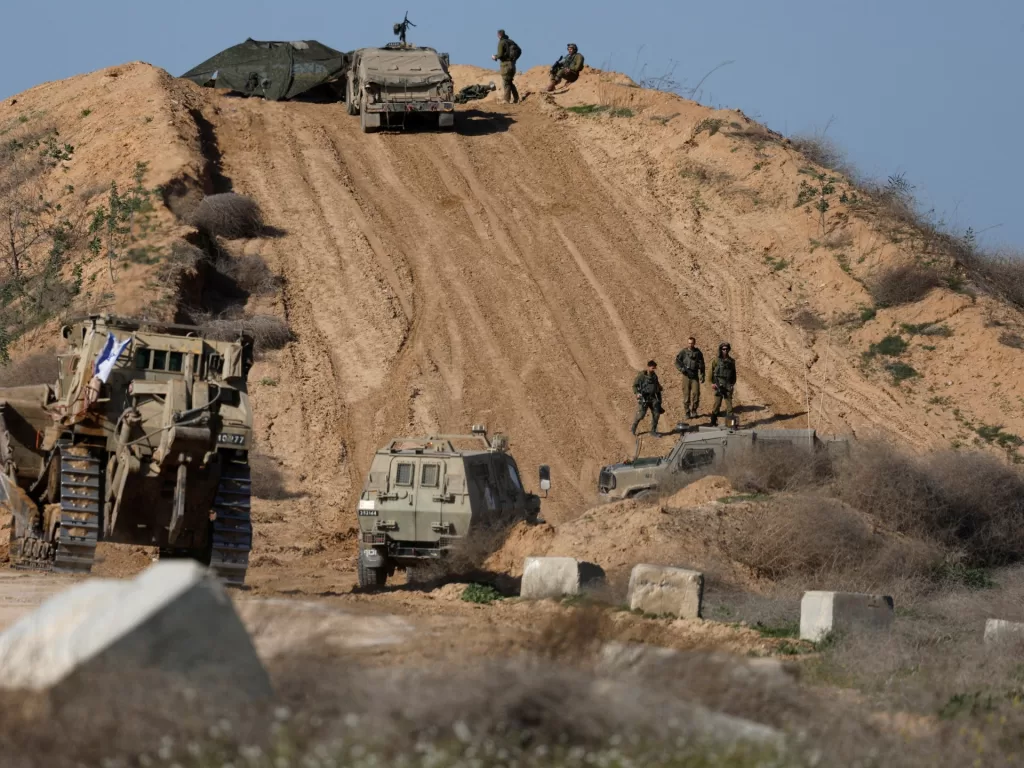Hamdan, who is based in Lebanon, told reporters on Thursday that Israel was “looking to establish a security belt along the borders of the Strip by levelling entire residential blocks and by bulldozing farms and civilian infrastructure”.
“This is a crime and a blatant aggression against our land and our holy places,” he said, adding that “our people and our resistance will foil these attempts.”
Hamdan called Israeli Prime Minister Benjamin Netanyahu “delusional” and said Gaza would become the “cemetery” of his plans. He also blasted the United States for “feeding” the Israeli military machine and for its complicity in crimes against Gaza.
Israel’s media on Wednesday reported that its military was aiming to create an informal buffer zone about a kilometre (half a mile) wide to prevent attackers from reaching Israeli communities near Gaza.
Two TV channels ran footage showing what appeared to be a controlled demolition of several structures on the Gaza side of the border, which the broadcasters said was done in the area of an attack that killed 24 Israeli soldiers on Monday, inflicting the military’s biggest loss of life in a single attack since October 7.
Satellite images from Planet Labs PBC taken last Saturday, a day before the attack, appeared to show the uniform destruction of buildings and agricultural fields in the area.
Military spokespeople have not used the term “buffer zone”, but say troops are uprooting infrastructure near the border to provide security for Israeli communities on the other side.
The general secretary of the Palestinian National Initiative party, Mustafa Barghouti, said the real intention behind such a move is to diminish Gaza’s size. If executed, Barghouti told Al Jazeera, it could only be perceived as an act of “ethnic cleansing” while also signalling a recognition of the failure of Israel’s military goals in Gaza.
‘Unjustified’ under international law
Geoffrey Nice, a former United Nations war crimes prosecutor, told Al Jazeera Israel has no grounds legally to create a “buffer zone” in Gaza by destroying Palestinian homes and confiscating agricultural land.
“If you want to a demilitarised zone that you’re going to fill with landmines, why not have it on the Israeli side and stop people crossing it?” he asked. “What they’re proposing, effectively and in anyone’s interpretation, is occupation.”
He noted the fertile farmland Israel is eyeing to take over is “crucial to Gaza’s economy”.
“But the process has already started. A large number of buildings have already been flattened. It is unjustified, by any view, under international law,” said Nice, proposing sanctions by powerful nations against Israel to stop the landgrab.
The US, which has staunchly supported what it says is Israel’s right to self-defence, said it is opposed to any attempt by Israel to shrink Gaza’s territory or to occupy it militarily.
The US and much of the international community have proposed a post-war plan that includes the creation of a Palestinian state as part of a two-state solution to the conflict, a possibility that Netanyahu rejected.
Barghouti said that if the US was serious about its opposition to the buffer zone, it would tell Israel to stop its attacks on Gaza.
“The United States is a participant, unfortunately, in this war, and as long as they don’t support a ceasefire, they become the participant in the war crimes that are happening in Gaza,” he said.
Al Jazeera’s Kimberly Halkett, reporting from Washington DC, said Israeli plans to create a buffer zone in Gaza are not going down well at the White House. “This is just another example of a growing rift between the [US President Joe] Biden administration and the Israeli government,” she said.
“There is some scope for a transitional arrangement on a buffer zone, but the worry… is that historically, transitional arrangements have become permanent.”
